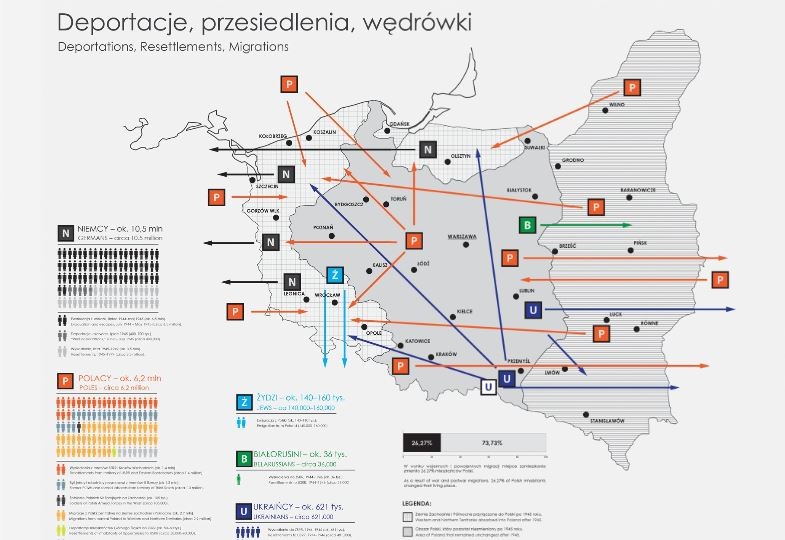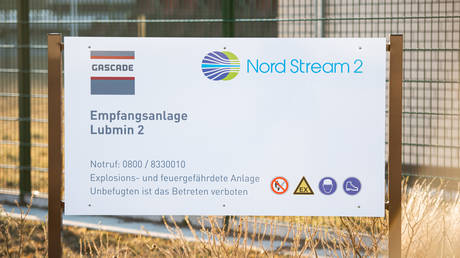Remigration Alternative for Germany and a Path Toward a Self-Confident Germany Once Again

From Martin Sellner’s (left) English-language Telegram channel.
words
Left-wing German media outlet Correctiv reported on January 12 about a private meeting that happened last November in Potsdam, Germany between prominent figures in Alternative für Deutschland (AfD), a rapidly growing Right-wing populist party that is now the second strongest-polling party in Germany, and Austrian identitarian leader Martin Sellner. The topic of the meeting: remigration.
Correctiv called the meeting “an attack on human existence.” The media blitz that followed drew an estimated 900,000 people in 80 cities to protests.
Founded in 2013, the AfD is a manifestation of the rise of national populism, defying the traditional Left/Right divide, and siphoning voters from the Keft-wing Greens, center-Right Christian Democrats, and center-Left Social Democrats to focus on controlling immigration.
The party set itself apart immediately. In 2016, in response to migrant arrivals which were overwhelming Europe’s border defenses, founding AfD Chief Frauke Petry called for German border guards to be authorized to shoot anyone who was trying to enter the county illegally (a practice for which there was already precedent in Israel). Voters continued to flock to the party due to its hardline stance on enforcing immigration law.
While this may be its most compelling policy priority, it is not the only attractive position earning AfD its spot in the polls. Germans are suffering inflation that tripled in 2022. They’re seeing their tax dollars being diverted to fight Russia. And farmers who are already feeling squeezed have been protesting the end of a diesel tax break.
Germany is facing an economic crisis. Asylum-seekers have cost Germany around 22 billion euros per year since 2020, as asylum applications have tripled over the last three years. In 2020, the country received only around 122,000 asylum applications, while in 2023 there were around 350,000 people, the bulk of whom come from Syria, Turkey, and Afghanistan.

You can buy Greg Johnson’s The White Nationalist Manifesto here
Martin Sellner earned his activist reputation as the face of the German-speaking wing of Generation Identity, a pan-European identitarian activist movement which originated in France in 2012, spreading across Europe and even gaining attention in the United States at its height in 2017, before suffering crippling investigations in 2019.
The identitarian movement is a response to the European migrant crisis. What we call “repatriation” in the US is cleverly termed “remigration” by European identitarians. Last summer, Sellner and other young Austrian and German identitarians went on a tour across the country to spread the message that remigration, meaning the peaceful return of migrants to their homelands, is possible.
Their efforts paid off. Remigration has now gained serious political attention.
According to Correctiv, the purpose of this private meeting in November — which was infiltrated by Greenpeace (yes, Greenpeace) — between Sellner and AfD officials was to discuss “a master plan to get rid of immigrants.”
To an economically struggling Germany that is tired of machete attacks that are too numerous to cite, truck attacks, and migrant rapes (also too numerous), this sounds like a great idea – but it isn’t quite accurate. As Sellner explains in a video on his English-language Telegram channel:
Some people are enthusiastic that the AfD is creating such a master plan not knowing that this master plan doesn’t exist yet . . . They [the AfD] have their own plans. What I’ve been drawing out is a mere suggestion that I’m going to throw in the arena, in the battle of ideas.
Sellner is planning a book on remigration to be published later this year which will then be translated into English. One of his ideas is the concept of creating a model state in Africa to which two million people could remigrate.
The Correctiv journofa, for their part, are thinking of something else: “What Sellner designs is reminiscent of an old idea: in 1940, the National Socialists planned to deport four million Jews to the island of Madagascar.”
Remigration as Sellner actually proposes it requires considerably less imagination. The concept of a model state in Africa is not unusual, and in fact has recently been proposed by blacks themselves. For example, the Guardian reported last December that Senegalese-American rapper Akon, inspired by Wakanda, outlined plans for a $6 billion metropolis that would serve as a thriving sanctuary for African-Americans hoping to return to their ancestral homeland.
Unfortunately, the only progress on Akon City so far has been a youth center featuring a mural of the singer.
Thankfully, we don’t have to wait on Akon City. Ghana, Senegal, and Liberia already have programs in place to encourage the African diaspora to “come home.” The Ghanaian Minister of Tourism, Oteng Gyasi, hopes blacks will respond to them, saying in 2020:
Please take advantage, come home, build a life in Ghana. You do not have to stay where you are not wanted forever, you have a choice and Africa is waiting for you.
Furthermore, the November meeting which caused such a stir is not the first meeting to be conducted in Potsdam surrounding the issue of remigration. In July and August of 1945, Winston Churchill, Harry Truman, and Joseph Stalin — all of them far from “neo-Nazis” as Sellner and fellow German identitarian Mario Müller are labeled in the Correctiv piece — negotiated the new Polish-German border there. The period following the Second World War was a time of great remigration for those who suddenly found themselves on Polish land. This was not at all considered an atrocity. In fact, it was unanimously agreed that the creation of ethnically homogeneous nations would diminish the risk of the outbreak of further armed conflicts. That’s right: Ethnonationalism was accepted as the norm.

A map of Polish remigration spanning 1944-1949 provided by the Polish History Museum in Warsaw. Click to expand.
Another remnant of Germany’s post-war occupation is the establishment of the Bundesamt für Verfassungsschutz (or the Federal Office for the Protection of the Constitution, or BfV). This intelligence agency is meant to protect the “liberal democratic basic order” of Germany. As part of rebuilding Western Germany, the US Army supervised this office from its founding in 1950 until 1955. Its methods of intelligence-gathering include mass surveillance, and it also has the authority to ban political parties which it claims threaten liberal democracy.
What is a threat to liberal democracy? Given the history of the BfV’s formation, the institution is understandably allergic to expressions of German ethnic identity. In fact, it is so sensitive that Bjorn Hoecke, Thuringia’s AfD parliamentary group leader, was prosecuted by the court last summer for ending a speech with the rallying cry of “Everything for Germany!” As a German voter, this sounds quite appealing. Any member of a normal, healthy society would see a politician who stands up for his interests as desirable. But Germans are not allowed to think of themselves as a group with unique political interests. The subsequent political and legal crackdown has been so dramatic that it has made it seem as if thinking this way in Germany is akin to calling for another Holocaust.
Due to the protests and media calamity caused by the Sellner meeting, the BfV is considering banning the AfD altogether. The BfV has never before banned a party with such a high level of support, however. Despite the media blitz, the AfD has hardly suffered in the polls, maintaining around 22% nationwide and in the 30% bracket in the eastern German states of Thuringia, Saxony, and Brandenberg, which will hold parliamentary elections this year. The AfD is also predicted to be a strong contender in the European Union parliamentary elections in June.
Is a ban truly possible? The German weekly Der Spiegel reports the Social Democratic Party’s General Secretary, Kevin Kühnert, as saying, “In the short term, such steps against the AfD are not feasible and therefore we should not leave the protection of our constitution to the Karlsruhe judges alone.” “If such a procedure before the Constitutional Court were to fail,” warned Federal Justice Minister Marco Buschmann of the Free Democratic Party, “it would be a huge public relations victory for the AfD.”

You can buy Greg Johnson’s Toward a New Nationalism here.
The process of banning a political party is indeed difficult. For example, it must be proven that the entire party is anti-democratic rather than merely MPs or members.
Even if an outright ban is unlikely, soft-power suppression in the form of surveillance, lawfare, and crippling funding cuts are almost guaranteed — and given that they are carried out largely unseen, are all the more insidious.
German domestic intelligence is on high alert. Last December, Remix News reported that an operation involving fake Right-wing accounts had grown so big that information-sharing between agencies became necessary so that the authorities would stop targeting each other. The AfD is actively surveilled, with membership in the party being the only prerequisite for agents to be permitted to read e-mails and listen in on private citizens’ telephone calls. Buschmann is also pushing for a joint EU-wide crackdown on Telegram.
If you want to ban a party without banning it, you can also cut off its funding. According to a BBC report, given that the BvD was unable to ban Die Heimat, or The Homeland party, formerly known as the National Democratic Party of Germany, it ruled on January 23 that it should be barred from receiving state funding and the tax breaks that German political parties legally receive. This is the first time Germany has cut state financial support for a party without banning it, and it is being seen as a model for how to deal with the AfD. Die Heimat faced a ban twice as the NPD, and both cases failed. While the court accepted that the NPD’s ethnonationalist ideology was unconstitutional and anti-democratic, it was decided that the party was too insignificant for a ban.
The AfD leadership is framing the calls for a ban as proof of its populist appeal. In a statement to Politico, Alice Weidel, the party’s co-chair, said:
Calls for the AfD to be banned are completely absurd and expose the anti-democratic attitude of those making these demands. The repeated calls for a ban show that the other parties have long since run out of substantive arguments against our political proposals.
Despite her optimistic rhetoric, Weidel fired her then-senior aide, Ronald Hartwig, due to his attendance at the meeting and shifted her public policy focus to “Dexit,” a Brexit-style departure for Germany from the EU. Although her party’s base is more sympathetic to this plan than the general German public is, it’s not a politically popular opinion, with over 80% of the German people saying that they prefer to stay in the EU. Even among AfD members, support for Dexit is still a minority opinion. According to polls conducted in 2023, 52% of the party supports remaining in the EU. Widel’s baffling maneuver offers a distraction to alleviate the media’s pressure on the party, but also distracts voters from the reasons they supported the party in the first place.
Sellner believes this is an effort to neuter the AfD’s demographic focus and create a culturally conservative party.
In a video response on his English Telegram channel, Sellner explained:
What they want to do is destroy the wing in the party, weaken the wing in this party that really wants a policy of remigration. They want to have a Right-wing party who is culturally conservative. But that’s not a real plan and that’s not a real solution for the demographic and the migration crisis and the population replacement . . . They want to destroy the discourse and the consensus that’s been forming within the AfD and the freedom party for the policy of remigration.
Politicians are indeed falling into the trap. Marine Le Pen, who is hoping to win the 2027 French presidential election, threatened the AfD yesterday with ending their cooperation in the European Parliament. I was optimistic about Le Pen earlier this year when she distanced herself from Italy’s Prime Minister Giorgia Meloni after the latter betrayed her voters by abruptly reversing her stance on immigration. Right-wing populist parties are expected to make major gains in the European Parliament this June, which makes Le Pen’s cowardice even more annoying.
Germany is facing an existential crisis. A report from the White-Papers Policy Institute succinctly presents statistics from the German Federal Statistical Office:
Between 2005 and 2022, the native German population suffered a 10% decline from 81.3% to 71.3%. While foreign-born persons in the country now account for 18.4% of the German population. Their children account for another five million people.
For Germany to remain German, there is only one rational path forward: remigration. As Sellner makes clear in his video:
For those who are citizens but are not assimilated . . . high pressure for assimilation but also incentives, financial and other incentives for remigration for going back to the country will be created. A policy of de-Islamization will be created, and the push and pull factors shall be inverted so long term, those parallel societies will shrink. And we will become majorities in our own countries again. A policy of remigration, in short, is a policy in which Germany becomes every day more German and not the other way around.
At present, Germany and the United Kingdom house half of Europe’s illegal migrants. When we include Italy and France, the four countries account for 70% of all illegal migrants. A turnaround in Germany could be a turnaround for the continent — and ultimately, for whites and Western Civilization.





